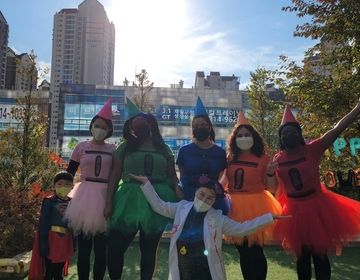Teacher . . . I like English. . . . How old are you?
First, I want to send my prayers to anyone who has been harmed or affected by Superstorm Sandy in any way, shape or form. When I first read about the storm last week, it was a tropical storm. When I talked with my Mom Karla about the storm this past weekend, it had changed drastically. Almost overnight the storm had become one of the most powerful storms the East Coast had ever seen.
My students call me “Evan teacher.” Until recently, they would ask me in the hallway, “Evan teacher! Hangulmal speak?” Hangul is the Korean language. Mal means language.
The Korean I know is choppy at best, at least that is how I feel. Even though some of my students know will try to talk to me in Korean, the others will quickly tell them I’m still learning Korean. Those students—the ones who correct their peers—will add words in when I am speaking their language and on occasion they will try to help me get a point across, especially when I am disciplining other students.
While most of EPIK’s week long teacher orientation said foreign teachers would only be speaking English in the classroom, my coteachers both told me to do the opposite. “It will get the students to listen to you more, and they will appreciate you more,” Jihye, my coteacher said when I had her and Heejung over for dinner. She and Heejung advised me to use Korean to help get the students to listen, at the very least.
Sometimes, my students do listen more when I speak Korean. They seem more interested in what I have to say. Often, as I said before, they will correct me, or the homeroom teacher will correct me, nicely. Sometimes they won’t understand me at all, and other times they will jump right into whatever it is I am explaining or telling them—and they will respond in English. Familiar words hit home for anyone, and my students are no different in that respect.
When I left the United States I had a penchant for English. Now I feel as though I am gaining an appreciation for language itself. I often hear other foreigners talk as if we are people from outer space, who just landed on earth. We have nostrils, eyes, we wear clothes, eat, sleep and walk on our hind legs just like Koreans, so how can we be from outer space? The answer is we are not—and language may not be the easiest but it is the clearest passageway to sharing similarities with someone from another culture. Thinking of language in this way, I try to speak Korean as much as possible when I leave my apartment, outside of school.
However, in the classroom, speaking slowly in English and providing examples for my activities has proved to be the most effective method to get my points across to the students, but speaking Korean does help, and I do my best to speak what words I know confidently.
The students also seem to listen better to me when they are competing for my attention. Jihye told me, “Always have the students compete. . . Competition is best.” With competition, sometimes I will give the students candy, sometimes their homeroom teacher gives them grade points, other times they just “win” the game or activity.
On Mondays I have three 6th grade classes. This Monday I chose two leaders for each 6th grade class. I chose the students who were most willing to help me, answer questions, etc. The team leaders were helpful, especially since I don’t teach with homeroom teachers for discipline or help in my fifth or sixth grade classes. Giving the students leadership roles proved to be one of my best decisions as a teacher. In one of my sixth grade classes, I have a stubborn and restless sixth grader who knows English quite well. In every class he screams the answers and talks over the other students. This week, I made him a “taejanim,” one of the two class leaders. His behavior changed almost immediately when I told him he was one of the class leaders. His demeanor changed, almost completely.
It’s almost as if each student is a bottle of energy, energy that needs pouring into the right cup. I was relieved when my 6th graders adopted their leadership roles so well. The other students listened to me more and the class leaders took their roles very seriously. As I continue to teach I’m sure I’ll find more ways than one to settle down the fifth and sixth graders, but this was unquestionably a step in the right direction.
Today, one of my third graders gave me a note she wrote. She does not talk much and I saw she had been struggling in class--which is why I was so surprised to see this. Although she doesn’t speak much, she smiles a lot. The note said:
My name is Kim Jun Un! Nice to meet you. How old are you? Teacher I like English.
I couldn't believe she had written that note. Third graders are urged not to write at Yeongyang Elementary. I put the note in a folder inside a box on my desk. I was so proud of her.
Related Posts
A Comprehensive Budgeting Guide for English Teachers in South Korea
A Comprehensive Budgeting Guide for English Teachers in South Korea Teaching English in South Korea has become an increasingly popular option for young people looking to travel and get some... keep reading
Professionalism in South Korea as a Native English Teacher
As a native English teacher in South Korea, understanding Korean culture and professionalism is crucial for both personal success and the broader impact you can have on your students. South... keep reading
How to Go to the Doctor in South Korea as an English Teacher: A Guide to Healthcare and Health Insurance
As an English teacher in South Korea, maintaining good health is essential while living abroad. Navigating the healthcare system can seem daunting and stressful at first, especially if you can’t... keep reading


